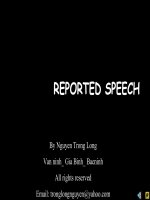Reported Speech_luyen thi dai hoc
Bạn đang xem bản rút gọn của tài liệu. Xem và tải ngay bản đầy đủ của tài liệu tại đây (233.94 KB, 20 trang )
REPORTED SPEECH
By Nguyen Trong Long
Van ninh_ Gia Binh_ Bacninh
All rights reserved
Email:
CONTENTS
I. DEFINITION
II. BASIC RULES
1. Tense changes
a. Basic tense changes
b. Other tense changes
2. Time and place changes
3. Pronoun changes
4. Reporting Verbs
5. Use of 'That' in reported speech
6. Indirect Questions
III. PRACTICE
I. DEFINITION
Reported speech (also known as indirect speech)
refers to a sentence reporting what someone has said.
It is almost always used in spoken English.
Reported speech doesn't use quotation marks to
enclose what the person said and it doesn't have to be
word for word.
When we use reported speech, we are usually talking
about the past (because obviously the person who
spoke originally spoke in the past). The verbs therefore
usually have to be in the past too.
"I'm going to the cinema".
He said he was going to the cinema.
II. BASIC RULES
When changing from quoted speech to reported
speech, several changes occur. In all sentences, the
quotation marks and the comma immediately before the
first quotation mark are removed. Next, the word "that"
is usually inserted after the reporting verb (say, ask,
told, etc.) Then, the subject pronoun is changed so that
the meaning of the quote is not changed. Lastly, the
tense of the verb is changed, or shifted.
She said, "I'm teaching English online."
She said she was teaching English online.
1. Tense changes
a.Basic tense changes
As a rule when you report something someone has
said you go back a tense (the tense on the left
changes to the tense on the right):
Direct speech Indirect speech
Present simple
She said, "It's cold."
›
Past simple
She said it was cold.
Present continuous
She said, "I'm teaching
English online."
›
Past continuous
She said she was teaching
English online.
Present perfect simple
She said, "I've been on
the web since 1999."
›
Past perfect simple
She said she had been on
the web since 1999.
Present perfect continuous
She said, "I've been teaching
English for seven years."
›
Past perfect continuous
She said she had been teaching
English for seven years.
Past simple
She said, "I taught online
yesterday."
›
Past perfect
She said she had taught online
yesterday.
Past continuous
She said, "I was teaching
earlier."
›
Past perfect continuous
She said she had been teaching
earlier.
Past perfect
She said, "The lesson had
already started when he
arrived."
›
Past perfect
NO CHANGE - She said the lesson
had already started when he arrived.
Past perfect continuous
She said, "I'd already been
teaching for five minutes."
›
Past perfect continuous
NO CHANGE - She said she'd already
been teaching for five minutes.
b. Other tense changes
Modal verb forms also sometimes change:
Direct speech Indirect speech
will
She said, "I'll teach English online
tomorrow."
›
would
She said she would teach English
online tomorrow.
can
She said, "I can teach English
online."
›
could
She said she could teach English
online.
must
She said, "I must have a
computer to teach English
online."
›
had to
She said she had to have a
computer to teach English online.
shall
She said, "What shall we learn
today?"
›
should
She asked what we should learn
today.
may
She said, "May I open a new
browser?"
›
might
She asked if she might open a new
browser.
!Note - There is no change to; could, would, should, might and ought to.
Things are slightly more complicated with imperatives.
positive imperative
Shut up!
tell + infinitive
He told me to shut up.
negative imperative
Don't do that again!
tell + not + infinitive
He told me not to do it
again.
imperatives as requests
Please give me some money.
ask + infinitive
He asked me to give him
some money.


